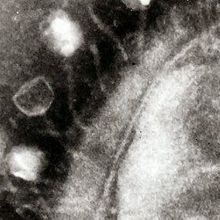Login
Subscribe404
Not Found
Is this what you were looking for?
tag indians developmental biology microbiology genetics genomics immunology evolution

The Inside Guide: The Gut Microbiome’s Role in Host Evolution
Catherine Offord | Jul 1, 2021 | 10+ min read
Bacteria that live in the digestive tracts of animals may influence the adaptive trajectories of their hosts.

The Pangenome: Are Single Reference Genomes Dead?
Catherine Offord | Dec 1, 2016 | 10+ min read
Researchers are abandoning the concept of a list of genes sequenced from a single individual, instead aiming for a way to describe all the genetic variation within a species.

2021 Top 10 Innovations
The Scientist | Dec 1, 2021 | 10+ min read
The COVID-19 pandemic is still with us. Biomedical innovation has rallied to address that pressing concern while continuing to tackle broader research challenges.
Epigenetics: Genome, Meet Your Environment
Leslie Pray | Jul 4, 2004 | 10+ min read
©Mehau Kulyk/Photo Researchers, IncToward the end of World War II, a German-imposed food embargo in western Holland – a densely populated area already suffering from scarce food supplies, ruined agricultural lands, and the onset of an unusually harsh winter – led to the death by starvation of some 30,000 people. Detailed birth records collected during that so-called Dutch Hunger Winter have provided scientists with useful data for analyzing the long-term health effects of prenat
Retroelements Guide Adaptation
Karen Heyman(kheyman@the-scientist.com) | Jan 30, 2005 | 6 min read
With inquisitive minds and tools as simple as a Waring blender, the work of early phage researchers such as Max Delbruck, Seymour Benzer, and Alfred Hershey generated much of the knowledge underlying contemporary molecular biology.

Life Science Conference Disruptions Due to Coronavirus
The Scientist | Mar 5, 2020 | 8 min read
Find out which meetings have been canceled, postponed, or are going ahead as planned.

Targeting Antibiotic-Resistant Bacteria with CRISPR and Phages
Anna Azvolinsky | May 18, 2015 | 3 min read
Researchers develop a CRISPR-based, two-phage system that sensitizes resistant bacteria to antibiotics and selectively kills any remaining drug-resistant bugs.
Stem Cell Discoveries Stir Debate
Douglas Steinberg | Nov 12, 2000 | 9 min read
Editor's Note: This is the first of two articles on questions raised by recent stem cell discoveries. The second article, focusing on various organs and the nervous system, will appear in the Nov. 27 issue of The Scientist. Researchers first isolated embryonic stem cells (ESCs) from mouse blastocysts almost 20 years ago, and a paper announcing the discovery of human ESCs emerged in 1998. Adult-derived stem cells (ASCs) have since become the rage in certain quarters of biology, with unexpected--

Resisting Cancer
George Klein | Apr 1, 2015 | 9 min read
If one out of three people develops cancer, that means two others don’t. Understanding why could lead to insights relevant to prevention and treatment.
60 Members Elected to NAS
Barry Palevitz | Jun 25, 2000 | 6 min read
Editor's Note: On May 2, the National Academy of Sciences announced the election of 60 new members and 15 foreign associates from nine countries in recognition of their distinguished and continuing achievements in original research. Nearly half of the new members are life scientists. In this article, The Scientist presents photographs of some of the new members and comments from a few of them on their careers and on past and current research. A full directory of NAS members can be found online a